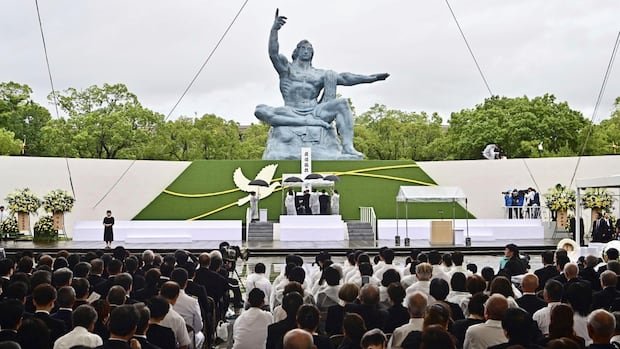The 80th anniversary of the U.S. atomic attack on Nagasaki, Japan, was commemorated on Saturday, honoring the memory of those who perished and the survivors who aspire to prevent any future nuclear devastation in their city.
The devastating Nagasaki attack took place on August 9, 1945, claiming the lives of over 70,000 individuals by the year’s end. This occurred just three days after the tragic bombing of Hiroshima, where approximately 140,000 people lost their lives. The conclusion of Japan’s aggression occurred on August 15, 1945, marking the end of World War II.
A gathering of about 2,600 attendees, including representatives from over 90 countries, convened at Nagasaki Peace Park for a memorial event. Notable figures present were Mayor Shiro Suzuki and Prime Minister Shigeru Ishiba, who delivered speeches. A moment of silence was observed at 11:02 a.m., the precise time the plutonium bomb detonated over Nagasaki.
Survivor Hiroshi Nishioka, aged 93, recounted the enduring trauma caused by the atomic bomb, emphasizing the long-term consequences such as unexplained ailments like gum bleeding and hair loss leading to eventual death. He passionately advocated for the permanent ban on nuclear weapons to avert catastrophic outcomes.
Symbolizing peace, numerous doves were released after Mayor Suzuki’s address, underscoring the city’s commitment to peace-building efforts. Suzuki emphasized the importance of preserving the memories of the bombing as a shared legacy to educate future generations globally.
Amid rainy weather, survivors and their families gathered at Peace Park and Hypocenter Park for solemn remembrance. Koichi Kawano, an 85-year-old survivor, expressed a simple desire for a world free from warfare, echoing the sentiments of unity and peace echoed by other survivors.
The dwindling number of survivors, now totaling about 99,130 individuals with an average age exceeding 86, underscores the urgency to document their experiences and pass on these narratives to younger generations. Teruko Yokoyama, vice-chair of the Nagasaki Atomic Bomb Survivors Council, stressed the importance of recording survivors’ testimonies and utilizing digital platforms to share their stories with wider audiences, embracing the involvement of younger advocates.
Prime Minister Ishiba reaffirmed Japan’s commitment to a nuclear-free world, pledging to foster dialogue and collaboration among nuclear and non-nuclear states at the upcoming Non-Proliferation of Nuclear Weapons review conference. The call for concrete actions towards disarmament was echoed by UN Secretary-General António Guterres, emphasizing the need for a strengthened disarmament regime.
Despite the challenges posed by nuclear threats and geopolitical complexities, survivors remain resolute in their pursuit of peace and nuclear disarmament, entrusting the younger generation with the critical task of upholding their legacy and striving for a world free from the specter of nuclear war.

